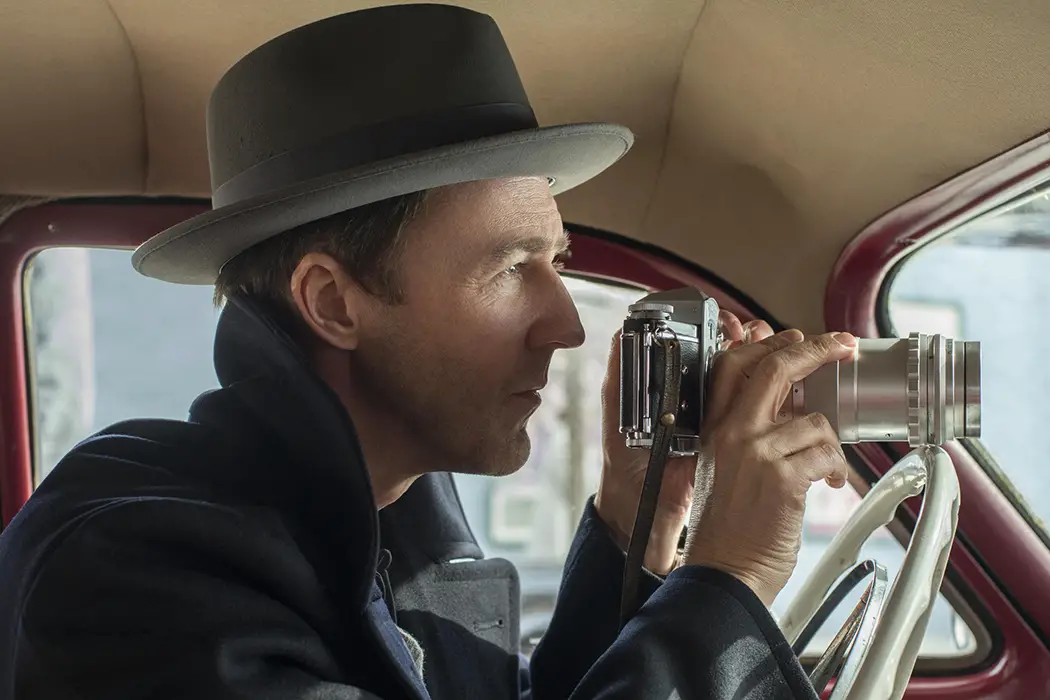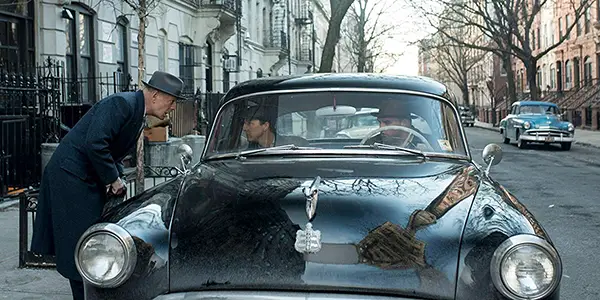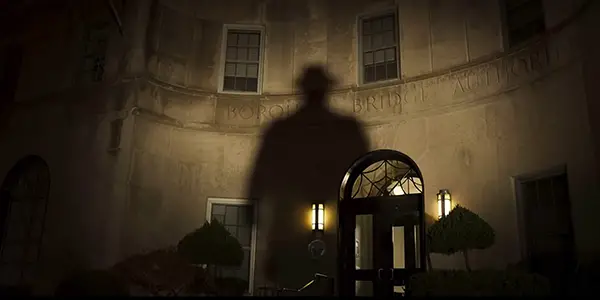MOTHERLESS BROOKLYN: Overlong & Tedious, But With Style & Heart

David is a film aficionado from Colchester, Connecticut. He enjoys…
Motherless Brooklyn was a film I had been looking forward to. As a fan of neo-noir crime films, and of Edward Norton‘s work, it seemed a promising endeavor, especially as it was a passion project of his. The passion and dedication to it is clearly evident; arguably, though, the film itself is somewhat misshapen. Overlong and occasionally meandering, it’s one that needed a bit more work on the cutting room floor. Yet it’s one that I can’t help but admire all the same.
1950s Crime Story
The original novel that Motherless Brooklyn was based on, by Jonathan Lethem, has some key differences; namely, that it takes place in the 1990s. Yet, as Norton himself has stated, it’s a story that feels much more of an older era, so he placed in the 1950s instead. It focuses on Lionel Essrog (played by Norton), who works at a detective agency for a man named Frank Minna (Bruce Willis). One day, while attending a meeting with some mysterious strangers, Frank is shot and unfortunately killed.
Lionel, who was listening in on the meeting and witnesses the shooting, is uncertain as to what it could all mean. Since he was essentially raised by Frank, he feels he owes him, and decides to go off on his own to investigate the murder. His search leads him to an ever-increasing web of conspiracies and double-crossings, entangling some very high-end individuals.

The story has the framework and basic outline you would expect in a classic Phillip Marlowe noir, with a complex narrative, some goons thrown in, and witnessing it through the perspective of one determined individual. Yet, where it distinguishes itself outright is with our protagonist himself. Lionel has Tourette syndrome, which infects him with a nervous tic; as a result, he is socially awkward and made fun of by his fellow investigators. Playing a very physical performance, Norton also thankfully doesn’t overdo it, portraying the character and likewise the syndrome in a sympathetic light. Either way, this is not the Bogart lead character you would’ve expected to see, which at once distinguishes it from many noirs of its like.
Neo-Noir Style
The style of Motherless Brooklyn is also one of its more praiseworthy aspects. With a score by Daniel Pemberton that evokes the soft jazz music of 1950’s noir, it brings you right into Lionel’s world, evoking his own lonesomeness and also the alienation often associated with that era. One song played during the film called “Daily Battles” is easily a highlight, featuring the chilly vocals of Thom Yorke of Radiohead and haunting bass and horns played by Flea of Red Hot Chili Peppers.
The film’s hazy blue-gray color palette lends itself nicely to the story at hand, as does the occasional use of shadowy outlines and charioscuro lighting, which is so associated with the noir genre itself. In addition to this, the world of 1950’s Brooklyn is fully realized in Norton‘s film, from the outfits to the cars to the jazzy clubs that the characters traverse. The story really does fit the setting as well, which leads credence to the decision that Norton transferred it to this time period.

Where Motherless Brooklyn often falters, though, is in not fully bringing together a cohesive narrative amongst the style and production. The film contains an intricate set of characters and events, which only get more complex as it goes on, yet it’s often to its detriment. Once we get to the final reveal, it’s evident that the complexity itself was merely an illusion, since it’s actually a fairly simple story. Norton clearly has something to say here, yet the film itself can be a struggle to get through, caught up in its own weight and excessive length, and occasionally dragging at inopportune moments.
Character Highlights and Final Takeaway
When Norton does get to the point, though, there can be a lot to take away from Motherless Brooklyn. The key characters that are highlighted here are not only Lionel himself but several of those he interacts with, including Laura Rose, sensitively played by the great Gugu Mbatha-Raw. As an activist against gentrification, she crosses paths with Lionel when he realizes that she had somehow had an association with Frank. In addition, Lionel often runs into or hears word about a man named Moses Randolph (Alec Baldwin), an extremely wealthy and powerful realtor who has become associated with the act that Laura is fighting against.

Moses Randolph, modeled after a man named Robert Moses, can clearly be associated with a certain high-governmental leader as well (who is amusingly also played on SNL by Alec Baldwin), yet even moreso, he represents the wealthy in general. Though the character’s dialogue does occasionally resemble a cliched over-the-top villain, it’s not hard to see him reflected in this divided world of ours, where the wealthy step over and have little concern for those on the bottom, who are simply trying their hardest. Edward Norton‘s film is therefore a reflective one of the times we’re living in.
Conclusion: Motherless Brooklyn
Motherless Brooklyn is, as you may be able to tell, a tough one to fully form a picture of. It’s a film for which it’s hard to completely recommend, yet not one to completely ignore either. With a little more tightening up, this could’ve been a roaring success. Instead, it feels more like a middling effort. Either way, it shows that Edward Norton has some promise as a director, and above all that his heart is in the right place.
What are your thoughts on Motherless Brooklyn? Are you a fan of Edward Norton’s work?
Motherless Brooklyn is now playing in theaters in the U.S. and will be released in the UK on December 6. For all international release dates, click here.
Does content like this matter to you?
Become a Member and support film journalism. Unlock access to all of Film Inquiry`s great articles. Join a community of like-minded readers who are passionate about cinema - get access to our private members Network, give back to independent filmmakers, and more.
David is a film aficionado from Colchester, Connecticut. He enjoys writing, reading, analyzing, and of course, watching movies. His favorite genres are westerns, crime dramas, horror, and sci-fis. He also enjoys binge-watching TV shows on Netflix.












